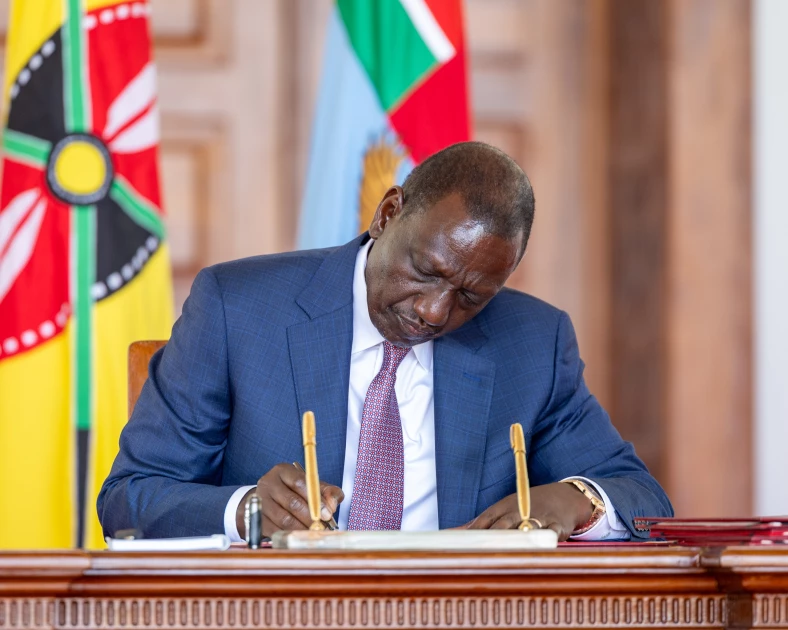The Finance Bill 2025 is due at a time of measured confidence in Kenya’s economy.
The economy remained steady even as it faced the mass protests of 2023 and the Gen Z-led protests of 2024.
Domestically, the country is faced with unprecedented debt issues which have seen its loan servicing guzzle over 60% of the national tax revenue. Kenya’s credit rating, currently “B-” with a stable outlook by both Standard & Poor’s (S&P) and Fitch Ratings, might mean increased borrowing costs, reduced investor confidence and debt sustainability concerns, all of which are not good for the country.
Kenya’s economy has shown resilience to external shocks such as the regional wars in Sudan, South Sudan and the Democratic Republic of Congo (DRC) as well as the long-running international wars in Russia-Ukraine or Israel-Gaza.
The Kenya Kwanza government, in pushing forward the Bottom-Up Economic Transformation Agenda (BETA), through the FY2025 says it is keen to achieve fiscal consolidation to reduce debt vulnerability while at the same time ensuring essential services are funded.
Cabinet ratification
After the cabinet ratified the Finance Bill 2025 on Tuesday, it has been presented in parliament for debate, public participation and the parliamentary procedure for eventually passing it into law.
In Kenya, the Finance Bill becomes law through a structured legislative process. First is the introduction of the bill, followed closely by its first reading. The bill is read for the first time in the House and then copies are circulated to all Members of Parliament (MPs).
Subsequently, the second reading takes place at which point the bill’s principles and policies, and amendments should be proposed.
Then follows the committee stage, during which time the bill is scrutinised clause by clause, and a vote is taken. The third reading, is the final version of the bill.
Debate and a concluding vote is taken by the whole house. Lastly, before the bill is declared law, it is sent to the President for assent. The President can either sign it into law or return it to Parliament with his recommendations and explanation on why he declined to assent to it.
By the afore-going, in parliament is where the rubber meets the road, as the eventual document takes shape and all the details concerning the bill come to the fore.
Lately, concerning the Finance Bill 2025, sentiments from a majority of expert observers are of the opinion that having seen the upheaval created by the since-aborted Finance Bill 2024, it would be advisable for the government to tread carefully around the issue of raised taxation for Kenyans.
True to this school of thought, the President and the cabinet ratified the Finance Bill 2025 with the rejoinder that it is a bold budget with no new taxes. Indeed, the President said the current Finance Bill’s aim is to ease the cost of living and restore public trust.
In an official communique from State House, Nairobi, the President directed all Cabinet Secretaries (CSs) to work closely with the National Treasury to further see where there could still be downward adjustments as the government is keen to keep the fiscal deficit at no more than 4.5% of the GDP for the FY 2025/26, down from 5.1% in the 2024/25.
This is a pointer to further substantial revisions of the initial Ksh.4.3 trillion budget before the much-anticipated document is tabled for the first time in parliament.
The Cabinet, in ratifying the Finance Bill 2025, foresees a scenario where the Finance Bill will be key towards closing procedural loopholes related to tax expenditures that have in times past been used to siphon funds from the exchequer.
The Cabinet hopes the bill will entrench efficiency by streamlining tax refund processes, and sealing legal gaps that hold back revenue actualization. The Cabinet hopes to achieve this by amending the Income Tax Act, VAT Act, Excise Duty Act, and the Tax Procedures Act.
The pros of the Finance Bill 2025
The Finance Bill proposes changes to support small businesses by allowing them to fully deduct the cost of everyday tools and equipment in the year of purchase which helps allay unnecessary delays in getting tax relief as was formerly the case.
The government has proposed amendment to Sec37 of the Income Tax Act on where application for reliefs, exemptions & deductions from a PAYE perspective shall stand. It proposes to give power to employers to carry out this function thereby saving employees the vagaries of applying to the Treasury for the same.
However, it is verified that most employers already undertake this function unless in a case where an employee is personally paying for medical or life insurance, in such a case, an employer may overlook such in the hope that the affected employees will claim the same when filing their annual tax returns.
While speaking to workers at the Labour Day fete in Nairobi, President Ruto said the bill will ensure tax-free per diem for private sector workers which will rise from Ksh.2,000 to Ksh.10,000, promoting fairness across sectors and ensure more money in workers’ pockets. Digital content creators are off the hook as the
President said that the 1.5% Digital Service Tax has been scrapped, giving a much-needed relief to them.
Pensioners have a reason to smile as the bill proposes that all gratuity payments and pensions be fully tax-exempt. The Bill also proposes that employers be empowered to apply all tax reliefs and exemptions wha en calculating income tax due to employees rather than wait for employees to apply to the KRA to seek for refunds.
For the counties, the bill seeks to mandate all of them to establish County Emergency Funds to ensure financial readiness to respond to future emergencies in a manner that would save lives, property and ensure continuity.
The bill seeks to establish a dedicated pension and retirement benefits framework for Judges of the Superior Courts by introducing a defined benefit system for serving judges and retired judges for financial security and protecting judicial independence.
In order to move more towards the goal of achieving Universal Health Coverage (UHC) and access to quality healthcare, the government has approved the construction of two level VI teaching and referral hospitals in Kericho and Bungoma counties in partnership with Africa Development Bank.
Lastly, the bill proposes to reduce the Export & Investment Promotion Levy from 17.5% to 5.0% for a number of construction allied products · These include semi-finished products of iron and non-alloy steel.
This is welcome news for the construction sector which has registered a lackluster performance lately in the face of steep rises in construction products.
The probable challenges posed by the bill
There will be stricter penalties for late or failed tax filings, reinforcing tax discipline across the board. This has many worried as late of failed tax filings are a norm in a population that is largely informal and with little or no access to digital filing mechanisms.
The bill shows that the Kenya Kwanza government has shied away from tax measures that directly affects the citizens by targeting goods that are currently zero-rated to be exempted from value-added tax (VAT). This means that those doing value addition, manufacturers and retailers will have no chance of recouping previously claimable VAT.
Zero-rated items allow businesses to claim VAT refunds on their inputs and raw materials without necessarily transferring these costs to customers. This helps reduce production costs for businesses.
By applying VAT-exempt to these same goods would mean that businesses have no chance to recover such tax expenditure, and will definitely transfer the costs to the end consumers, thereby making the goods more expensive.
The production of goods to be affected include transport services for sugarcane from farm to factory, raw materials used to produce medicine, input for locally assembled mobile phones, input for production of electric bicycles, input for solar and lithium-ion batteries, and raw materials used for animal feed production.
Aircraft spare parts will be exempted from tax, a move designed to boost Kenya’s aviation industry, the government says. However, some observers worry this could be another move towards smoothing a niche turf as this is obviously a sector affecting a minority whereas such affirmative actions would deal a lot of good in sectors like energy and agriculture that affect the majority of Kenyans.
The Bill proposes to do away with Sub-sec1B of Sec59A of the Tax Procedures Act. Sub-sec1B of Sec59A of the Tax Procedures Act bars KRA from demanding integration of the systems of a business with its own with respect to trade secrets & private/personal data held on behalf of customers or collected in the course of business.
The real fear here is that businesses will have their privacy compromised and in in extreme cases there might be matters accessed, via this integration, that would put the business life at stake such as business secrets or product formulas.
This proposal will grant the Revenue Authority unprecedented reach on personal data for tax compliance purposes and this also is a matter of concern as personal data is subject to the regulation and direction of the Data Protection Act of 2019.
Many are therefore asking, what’s the difference between this move and the aborted Finance Bill 2024’s proposal to exempt KRA from the constraints of the Data Protection Act?
The bill promises a very rough time for Kenya’s transport sector as KRA introduces new advance tax rules, effective 20th Jan 2025. All commercial vehicles such as trucks, vans, pick-ups, prime movers, and trailers will be subject to an upfront amount of Ksh.2,500 per ton of load capacity.
This is almost punitive for a sector that has suffered the vagaries if runaway fuel costs over the past few years and continues to experience depressed demand due to a rise in operational costs.
The bill proposes to increase the number of days the KRA should take to determine a tax refund from 90 to 120 days · The bill also proposes a period for refund audits timeline to increase from 120 days to 180 days. From a taxpayers’ cash-flow viewpoint, this will compound the limitations they are already dealing with. The 90 days was already bad, what about 120?
The Finance Bill puts the recurrent expenditure at Ksh.1.3 trillion and debt interest repayment at Ksh. 1.1 trillion, while the funds earmarked for development is less than Ksh.300 billion. This is by far the most alarming statement derived from the bill. The government seems to be in a hole and it is still digging deeper, the results might be with us soon.
A healthy economy would require robust development funds which is the fuel in the engine of a smooth-running and healthy economy.
MPs should deal with clean and open arms
However, the Finance Bill 2025, like a ship approaching the harbour, is almost a month away from docking and even though some adjustments could be made as already desired by the government, the document will not change substantially.
Despite this, Kenyans should prepare to not only read and understand the document but it would also be noble to take the part of active citizens and participate during the public engagement process to put forth their contributions towards the final document.
It would be noble to have the legislature to act in prudence and with open hands to consider public input within the final document and move away from performing legally needed procedures to simply satisfy legal requirements without listening to the public.



